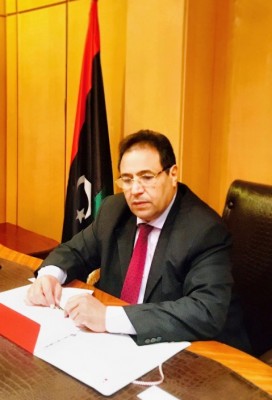By Houda Mzioudet and Moutaz Mathi.

Tunis/Tripoli, 26 August 2016:
Omar Al-Aswad, one of the two boycotting members of the Presidency Council (PC), says he is ready to rejoin and take part in choosing a new government. This, he said at a press conference at the Palace Hotel in the Tunis suburb of Gammarth yesterday, would have to be done “in a consensual, positive and constructive spirit”.
The move follows the rejection earlier this week by the House of Representatives of the current Government of National Accord in Tripoli and its demand that the Presidency Council submit a new cabinet within ten days. After the vote, HoR President Ageela Saleh called on Aswad, from Zintan, and the other boycotting PC member, Ali Garani from Cyrenaica, to rejoin the PC. So too did UN Special Envoy Martin Kobler. Two weeks ago, the head of the PC, Faiez Serraj gave both men a week to rejoin, otherwise he said he was ask the Libya Dialogue team to replace them.
Both have boycotted the PC for most of the year.
In his statement yesterday, Aswad said that the proposed government would have to be formed “according to the determined conditions”. He also called on Gatrani to rejoin the PC and participate in the formation of the new government.
Efforts to unite the various different Libyan viewpoints needed to be intensified with the help of the international community, he said, appealing to the Presidential Council members “to avoid dividing state institutions along regional lines”.
With the continuing deteriorating economic and security situation in the country, the “deep economic haemorrhage” as exemplified in the fuel smuggling, foodstuffs, fake funds and illegal trading, Libya was on the verge of bankruptcy that threatened its very existence, Aswad warned. Time was against the PC and HoR in light of the divisions of the main financial and administrative institutions.
He also stressed the necessity of unity and sense of responsibility and integrity to run the institutions that constitute the backbone of the nation’s stability.
The new government’s members had to be selected on the “sound bases” of professionalism and integrity in order for it to obtain the approval of the HoR, he added. He deplored past mistakes during the formation of the first and second government in the last seven months, claiming there had been nepotism.
“The eyes of the world and people in Libya had looked at the PC in December 2015. It had the was responsibility to produce a Government of National Accord (GNA) that could lead the country to peace and bring stability to people. This unfortunately didn’t happen, instead there was a massive struggle over posts and offices among members based on their regional backgrounds,” he said.
All parties had to make concessions if there were to be a peaceful solution to the Libyan crisis, he said.






